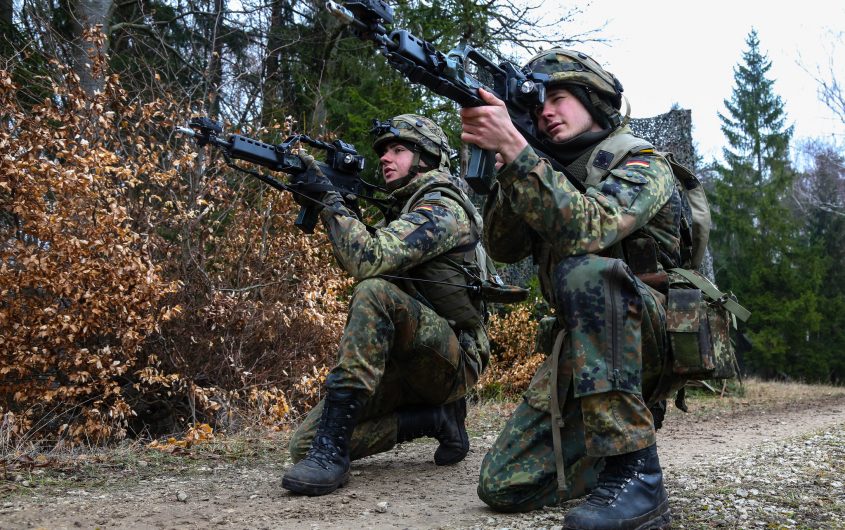
U.S. Army photo by Spc. Danielle Carver via Flickr
A European Army: The Wrong Choice for Germany Among Greater Defense Woes

Heidi Obermeyer
CTIA - The Wireless Association
Heidi Obermeyer is the Policy and Communications Manager at CTIA - The Wireless Association. She was a 2017/2018 Alexander von Humboldt Foundation German Chancellor Fellow at the German Council on Foreign Relations (DGAP e.V.) conducting research on German foreign policy and transatlantic relations. Prior to joining DGAP, she was a Fellow and Program Coordinator at the Center for Transatlantic Relations at Johns Hopkins University SAIS. She has worked for the Department of State at the U.S. Embassy in Berlin, for the U.S. Commercial Service in Munich, and in federal consulting in the Department of Veterans Affairs. She holds an MA in Political Science with a concentration in European Governance from the University of North Carolina at Chapel Hill and a BA in International Affairs, Germanic Studies, and Anthropology from the University of Colorado at Boulder.
She is a 2018-2019 participant in AICGS’ project “A German-American Dialogue of the Next Generation: Global Responsibility, Joint Engagement,” sponsored by the Transatlantik-Programm der Bundesrepublik Deutschland aus Mitteln des European Recovery Program (ERP) des Bundesministeriums für Wirtschaft und Energie (BMWi).
French president Emmanuel Macron’s call for a European army at the beginning of November was met with some justified eye-rolling on both sides of the Atlantic. Chancellor Merkel and defense minister Von der Leyen have both toed a fine line regarding the issue, supporting the idea of further defense integration and cooperation but also hedging against specific plans for a European defense force in addition to national militaries. Pursuing a European army is the wrong choice for Europe. This is especially true for Germany given other, more urgent challenges it faces in increasing defense spending: waning public interest in a close German-American relationship due to President Trump and his policies, the lack of political will to create a vision for Germany’s defense strategy over NATO’s lifetime, and the significant costs of creating new cooperative agreements rather than working through existing organizational structures.
Increasing defense capabilities is far from a domestic political impossibility, but Germany faces difficulties in increasing the spending while denying any causation from the U.S. president’s blustery rhetoric.
Germany’s defense spending is a favorite topic of consternation in transatlantic relations under Trump, but the president’s huffing and puffing on the issue has actually made it more difficult for German policymakers to move on building out the Bundeswehr. With an approval rating of just 10 percent in Germany, President Trump’s ideas are vehemently opposed on principle by many Germans, making it difficult to take his claims as a starting point for discussion of the very real weaknesses in Germany’s defense spending and contributions. Despite knee-jerk political opposition to increased defense capabilities—primarily centered in the center-left SPD—43 percent of Germans support increased spending and about half support increasing the size of the Bundeswehr. Those numbers indicate that increasing defense capabilities is far from a domestic political impossibility, but Germany faces difficulties in increasing the spending while denying any causation from the U.S. president’s blustery rhetoric. The impact of the president’s statements are twofold—not only do they complicate the possibility of real progress in spending increases by focusing on relatively inexact measurements like the 2 percent requirement, but they may also increase support among the population for a defense policy that is less dependent on and integrated with the United States, a complete departure from the postwar security order.
Conversations about German defense spending now have to maneuver not only through the complex historical context in which all German foreign policy decisions are made, but also between the America the world wishes for and the America the world has right now. The transatlantic alliance—and individual NATO member states—did a bad job of an extremely tough job, maintaining public awareness of the importance of NATO in preserving peace in Europe and, for better or worse, the role of the United States in providing not only a nuclear umbrella, but also significant defense resources and funding within the alliance since its inception. Europe’s struggle to convince skeptics that a more autonomous European defense system is worthwhile must also address this, making citizens aware of the extent to which U.S. funding and troops provided for peace and security in Europe over the past 70 years.
Germany and France alike would get the most bang for their buck by sticking with their NATO allies, not by executing a parallel project.
This is not to say that Franco-German defense cooperation isn’t a significant power for good— getting 50 percent of Europe’s military-industrial prowess on the same page could have positive implications for transatlantic defense as a whole—but that adding yet another project to the mix of PESCO, NATO, and bilateral cooperation will create more red tape and bureaucracy without achieving beneficial results for Europe’s existing defense commitments. Defense minister Von der Leyen addressed this at the Berlin Security Conference at the end of November, highlighting the success of existing European programs like CARD or military mobility initiatives undertaken with the Dutch that address the non-glamorous aspects of defense cooperation—interoperability, relationship-building, and establishing common procedures and troop integration. These tasks sound nearly as good as a buzz-worthy European army, but they will make a greater contribution to the preservation of the West than adding more initiatives. From a strategic perspective, Europe’s most significant threats are located in areas such as the Eastern flank, where NATO has done substantial work to shore up defense capabilities and conduct joint exercises. The stakes are high, and Von der Leyen concluded her speech in Berlin by pointing out how much Germany and Europe stand to lose if they don’t speak as part of a strong transatlantic voice, particularly when it comes to territorial sovereignty and Russia’s increasingly confrontational actions in Ukraine. Given these arguments, Germany and France alike would get the most bang for their buck by sticking with their NATO allies, not by executing a parallel project.
While an EU army wouldn’t be the right choice for improving Europe’s security, Macron deserves credit for pushing Europe to have tough conversations about its future and further integration in trying times. Germany should continue its commitment to multilateralism by working through existing structures to improve Europe’s defenses and address the unique challenges it faces in building out its defense capabilities rather than wasting resources on another broad initiative.









